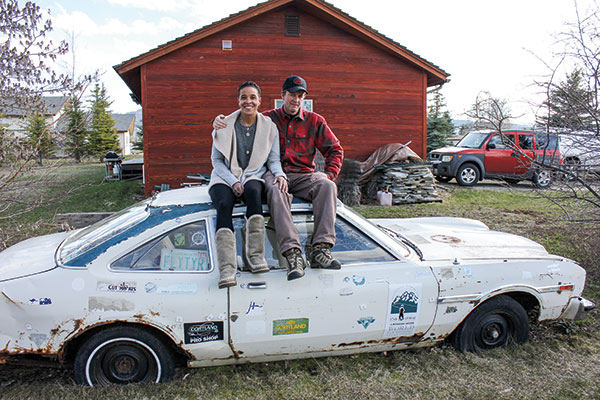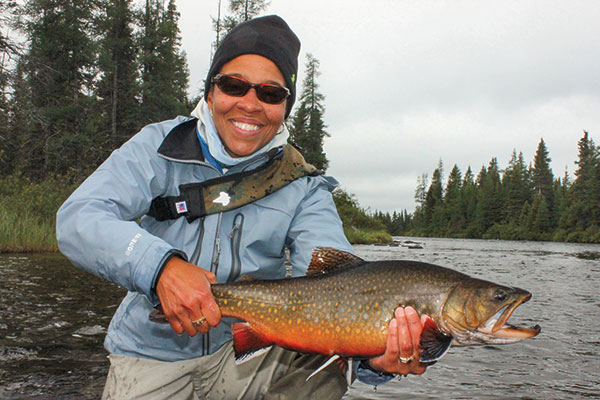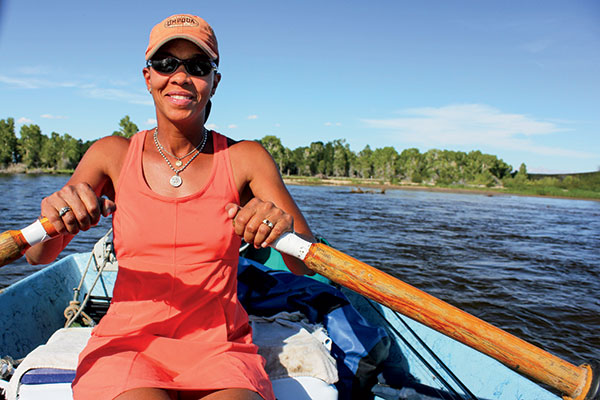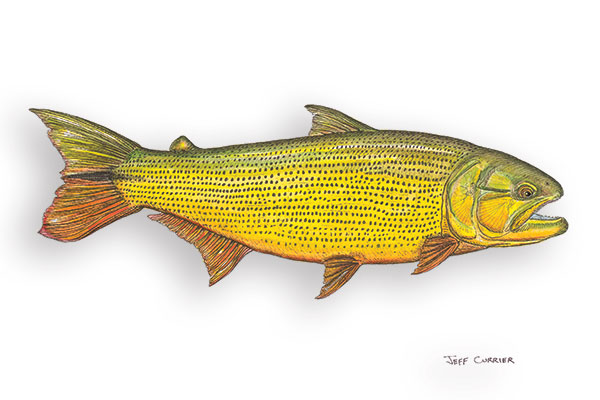January 08, 2018
By Sarah Grigg

In 2015, I drove from Bozeman, Montana to Victor, Idaho—through the Madison Valley elk herd, by the monster trout of Henry's Lake, over the Ashton railroad tracks, past the siren call of huckleberry shakes at the Victor Emporium, took a right at the Knotty Pine Supper Club, and ended up in a chicken coop which was converted to a recording studio by bluegrass legend Ben Winship. Filmmaker RA Beattie and I met there with pro angler Jeff Currier to record segments for the fly-fishing film Turning Points North.
The goal of the film was to capture Currier landing a 50-inch Saskatchewan pike on his 50th birthday. Jeff Currier is a prominent pro angler in the Greater Yellowstone region. He's known for having hit all the hot spots before they were hot spots—whitewater trips for mahseer in India, jungle tarpon in Central America, trout on the Henry's Fork when the fishery was at its peak. But he's also known as a do-it-your-self achiever. As he told me at the time: "Growing up in New England, I never saw myself as an office boy. I studied to be a naturalist in college, and held a lofty goal for after graduation: to be a fishing bum."
He started at the bottom of the totem pole at the Jack Dennis fly shop in Jackson, Wyoming, working for $4.75 an hour, made his way to manager, and then became more of a guide, instructor, book author, and artist.
Advertisement
"I was always drawing knots for people," he said, "So, I wrote my first book on saltwater fishing. Gary LaFontaine told me I would have to pay an artist to illustrate it. I said 'screw that' and decided to teach myself to paint. I illustrated the book and Gary published it."
Jeff now focuses on traveling around the world for exploratory and hosted angling adventures and produces original artwork, as well as maintains an impressive travel blog. After recording, we returned to Currier's place to peruse his trophy fishing photos, and view the mounts hanging in his garage from his days as a budding taxidermist, like a possum hanging from a branch and holding a beer can. We snapped a few photos, and on the way out the door, I noticed a pair of boots with elaborate white quarter stitching, the kind of boots that separate the women from the girls.
"Jeff," I asked. "These are clearly not yours. Who do these boots belong to?"
Advertisement
"Those are my wife's. I love it when she wears those boots!" he exclaimed.
Jeff, as it turns out, is married to a kickass fly fisher who also has fabulous taste in Western footwear. But I was late to the game. Everyone from the Henry's Fork to the Snake knows that the Jeff Currier story is actually the Jeff and Granny story. So I returned to Victor in Spring 2017 to get the other half.
In the early 80s, Jeff was a sophomore at Northland College in Ashland, Wisconsin, an outpost town located 5.5 hours north of Milwaukee on the shore of Lake Superior.
"I fished every single day of college. I met her at the college bar, back when you had a bar on campus," said Jeff. Granny—who at that time went by her given name, "Yvonne—was smoking and playing quarters. Jeff worked his way into the game and asked her out.
"Our first date was ice fishing," Granny recalled. "Jeff picked me up in his '76 Dodge Aspen. I stepped into it and asked, 'What is that horrible smell?' He said, 'Oh shit, I spilled a bucket of minnows in here and haven't had a chance to clean them up.'"
"There are probably still a few in there," Jeff said. The Aspen was Jeff's grandmother's, and now sits on the Curriers' lawn in Victor. He drove it from age 17 to 43, with 517,000 miles on the odometer by the time it found its final resting place, where it's now filled with firewood. In their bathroom hangs a photo of Jeff and Granny sitting atop the Aspen in its glory days, parked on frozen Lake Superior on one of their dates.
"I'm from Harlem, so I had never even been on ice like that. I'd never seen a frozen lake," Granny explained.
Escape from the City
Granny's father was a German who in his teens was forced to join the Hitler Youth. He immigrated to New York after the war, worked as a carpenter, and met her mother, an African American woman from Florida, in a Harlem nightclub. The two married and had Granny and her sister.
Harlem has always been marked by a series of boom-and-bust cycles. Life there in the 60s and 70s hardly reflected the 1920s Harlem Renaissance of jazz, art, and literary vibrancy often glorified in historic portrayals. In Granny's time, the neighborhood was dangerous as hell, riddled with violence and crime.
"I've seen it all. And by all, I mean all," she said. "You didn't go fishing. You were just trying to stay alive—not get shot, not get into drugs, not get pregnant."
In spite of living in one of America's most dangerous urban areas, Granny dreamed beyond the concrete.
"I always loved the outdoors," she explained. "I watched Marlin Perkins and Marty Stouffer's Wild America. I wanted to study animal husbandry. I got into Northland College. My parents didn't have the money to send me to a private school. They told me, 'If you're serious about this, there's a Chase Bank on the corner down the street and we suggest you go there and get a loan.' They couldn't believe I got on a plane on my own and headed to Wisconsin. But I wanted to get out of New York and that was my chance."
Soon after she met Jeff, her father died and she returned to New York.
"I got temp jobs and worked just enough weeks to buy a plane ticket back to Wisconsin. My mother wanted to kill me. But I was in love. We did that for two years," Granny said.
"She loved to fish, I think," said Jeff.
"And ride in the stinky Aspen," countered Granny.

The two drove the Aspen west during the summers of '86 and '87 to work in Yellowstone National Park. Jeff scooped ice cream for tourists, and Granny cooked meals for wranglers. They built their life around a fishing schedule.
"We fished Slough Creek five days a week. Our shift was seven in the morning to two in the afternoon or two to eight at night. So we fished around those hours," explained Jeff.
"We fished the Henry's Fork and Madison on our days off."For Granny, the summers away from the city solidified her direction. "I just knew that was me, living that natural lifestyle, being outside. The city has too much static for me," she said. "It was fun for me because it was easy to impress her," said Jeff.
Jeff had his world to share with Granny, and she had her world to share with Jeff. He's rustic, soft-spoken and down-to-earth, an old-school New England Yankee in many senses (with an unexpected love for the Chicago Cubs).
Granny's urban upbringing within a cross-cultural family gave her worldly understanding. She's louder than Jeff, vivacious, and sophisticated, with incredibly refined taste in everything from art to Champagne. But in spite of their on-paper differences, the two have held a common goal of building a life together focused on fishing.
After those Yellowstone summers and Jeff's graduation, the two moved to Jackson, Wyoming. Granny worked in retail at Lee's Tees and Hideout Leather—classic rites of passage in Jackson. She moved on to the Belle Cose furniture and clothing store conglomerate, another Jackson staple where she is still an employee. Jeff worked at the fly shop, and brought shop orphans home for the holidays and all-night Wiffle Ball games.
"I made a big spread, and Jeff told me I was like a little Granny, and the nickname just stuck. But now I just say it's because I'm his old lady," she joked.
Back then, the same as now, they fished every minute they could.
"We could not wait for opening day on the Henry's Fork," said Granny. "We spent two months on the Fork, fishing every one of our days off—leave Monday night, sleep in the back of the Aspen or on the ground, and fish all day long, way past sunset."
"Granny's an incredible dry-fly fisher. Precision casting is her thing. She has stealth and finesse on the Henry's Fork, fishing with an 18-foot leader," said Jeff. "Would you call yourselves hippies?" I asked.
"'Hippies' would not be the word for us so much as 'fishing bums,'" quipped Jeff. Their story may be called "Trout Bum Love," but remarkable relationship aside, Jeff and Granny are the last of the true trout bums, bootstrappers who made their way West with no money in their pockets, did whatever it took to stay there, and planned every aspect of their existence around fly fishing. Neither mentioned the word "barrier" once in describing their individual and combined journeys from the East Coast to Wisconsin to the West.
Henry's Fork fixture Mike Lawson, angling author and founder of Henry's Fork Anglers, got to know the Curriers very well. He and Jeff often worked at the same fly-fishing shows and events together.
"Nobody could ever miss that car on the Henry's Fork. It was an icon," said Lawson. "I can tell you Jeff wouldn't have done the stuff he's done without Granny. She loves the experience of fishing and going everywhere. And she's humble. She's never wanted to get noticed for it. She's just done it."
The Curriers moved over Teton Pass to Victor in 1991, bought a house with a northern view of the Grand Teton, and have been there since.
"There were 191 people living in Victor at the time we moved here," said Granny. "We virtually had the Tetons to ourselves. The Knotty Pine was filled with ranchers. People rode horses in the Timberline Bar."
"Wading on the Henry's Fork is why we live in Idaho. We don't get to fish it as much as we used to, but it's our favorite for sure," explained Jeff.
Jeff worked his way up in the fishing world and began hosting trips in Belize in the early 90s. With that, the Curriers started traveling internationally. "I went out on a limb in 1988 and invested my entire savings, 2k or so, in a trip to Belize," Jeff said.
"It turned out to be the best month of saltwater fishing of my life. Between 1988 and 1992 I went to Belize every spring and fall for about a month at a time with clients. Every time I finished those hosted trips, I hopped a bus to Guatemala or Costa Rica and kept going further south—Peru, Venezuela, fishing my way through South America."
Granny joined Jeff for a Belize honeymoon in 1993.
"Granny got her ass handed to her by a tarpon on that first trip," Jeff said. "But we returned in 2011 and she got it done."
"I decided I was going back to catch my damn tarpon," she asserted. And she did, landing a 150-pound specimen. That tarpon ranks second in Granny's epic catches, right after a 65-pound yellowfin tuna at Christmas Island.
"I swear that tuna went to the bottom of the ocean," she said. The guide whispered to Jeff, "I don't know how she's hanging on to that." But Granny brought the fish in. As they sank the gaff, her rod shattered.
"I thought your salmon in Iceland was pretty epic," said Jeff. "Yeah," she responded. "That one was pretty good too."
A Life of Fishing Travel
Cruise ships and five-star accommodations aren't really the Curriers' thing. An international challenge is more their style. Jeff, now 51, and Granny, 50, are extreme travelers.
Longtime Jackson Hole fishing guide Scott Sanchez met Jeff and Granny in '87 or '88, he can't quite remember which year. But it was when the Dodge Aspen had floorboards and Granny still went by "Yvonne."

"When I met Jeff, that car had a flat tire. And Granny was a New York girl and couldn't drive. She didn't get a license for years," says Sanchez. (Granny finally got a license when she was 33.) "She's into doing her own thing, really independent. And she could always fish really well. Those two have always been very adventurous. They'll take off for places where there are civil wars and that doesn't seem to bother them one bit."
As recently as 2015 the Curriers went to Salalah, Oman, at which time the Saudis were conducting air strikes in Yemen. The two rented a camper and drove north along the coast in pursuit of African permit and giant trevally.
By "along the coast," I mean "on the beach." Jeff plowed the camper through sand dunes with flocks of seagulls pelting the windshield. King tides crept up to the camper wheels in the middle of the night. The Oman military visited their beach encampment in a tank to check on them, and ended up offering friendly fishing advice. The Curriers spent entire days in sweltering heat fishing the surf. Just over the border, missiles were being launched and could be heard and seen at night.
And then there was that time in 1996 that Jeff and Granny hiked the Inca Trail on their own, with the Shining Path militia fading in and out of the area. For Jeff and Granny, danger equals advantage — hostel rooms open up, rates drop, and normally packed trails are empty.
"Without the Internet it was hard to plan trips. We used Lonely Planet guides and other books. We planned our self-guided trek in Nepal to the Everest Basecamp that way," said Jeff.
"We almost had to cancel that trip to India and Nepal because of the Maoist Revolution," said Jeff. "We went anyway and rode buses and trains and got Salmonella. We returned to Kathmandu to celebrate the end of the journey. There was a curfew at sundown.
"We went to a bar and it got late. The owner urged us to leave, so we walked out. As we headed down the street, a group of teenage boys started toward us. We took all the napkins at dinner because there was no toilet paper anywhere. I had a wad of napkins in my pocket that looked like cash. These kids surrounded us and started to pickpocket me. I had purchased a few books about mahseer and carried them in a plastic bag. I swung the bag of mahseer books and hit one of them with it. I got him good, and the others ran off but by then our toilet paper was stolen."

"For the most part, we've been very lucky," Granny said. "Jeff always has to go to the roughest part of town. He knows there will be a fish market there where he can examine fish and take pictures. I always say, 'Why do we have to go to the worst part of town? I grew up in the worst part of town. I already know what it looks like.' But nobody ever messes with me. They'll mess with him first. I've got street smarts. "In April, when I interviewed them, the Curriers were putting themselves through roosterfish bootcamp. Weights were tucked in the corner of their living room along with a stack of high-intensity workout DVDs. Jeff and Granny take their expeditions seriously and train for roosterfish beach sprints and Everest basecamp hikes in their living room and throughout the Tetons.
They have high expectations of each other to fish as hard as possible."Some women complain that they enjoy fishing, but their partner doesn't take the time to show them how. Jeff has always been generous with his knowledge and time. He's always wanted to make me a better fisherman," said Granny."That's right," Jeff responded. "Granny's totally spoiled. She's never seen bad fishing."What has it meant to share a passion like fly fishing with the person you feel most passionately about?"It's meant I'm damn lucky. When I met Granny 30 years ago, it was hard to find a gal to fly fish with.
I think she feels lucky too, coming from her background," said Jeff. One thing is certain: Jeff and Granny will always be on the water somewhere, and often a place most wouldn't dare to go. And the Aspen will always be parked on the lawn.
Sarah Grigg (sarah-grigg.com) is a writer and editor based in Bozeman, Montana.

